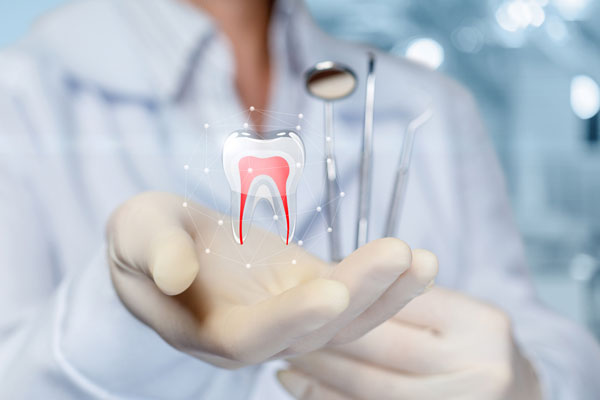What Are the Warning Signs of Periodontal Disease?

Are you wondering if you have periodontal disease, more commonly known as gum disease? It is essential for you to know the warning signs of this common dental issue. This way, you will have a better chance of addressing the issue without needing excessive dental treatment.
When gum disease is addressed in its beginning stages, it is much easier to treat. When gum disease is ignored, which is common because many people do not know its signs, more severe forms of dental treatment are necessary, e.g., deep cleaning.
Periodontal disease
There are four different stages of periodontal disease. The first stage is gingivitis, the second is slight periodontal disease, the third is moderate periodontal disease, and the fourth and last stage is advanced periodontal disease. Treating the first stage requires professional dental cleaning and improved at-home oral care. The second and third stages are treated using a more in-depth dental cleaning process known as scaling and planing. The fourth stage of periodontal disease is treated using surgical processes specifically made to clean deep bacteria-filled pockets.
Warning signs of periodontal disease
The following is a list of common warning signs of periodontal disease.
Gum swelling and inflammation
Swollen, inflamed, sensitive, and red gums indicate gum disease. These signs are specifically due to the buildup of bacteria that causes plaque and eventually tartar, which releases toxins in the mouth.
Bleeding gums
If the gums bleed when brushing, flossing, or eating, this is one of the most common warning signs of gum disease. While bleeding every once in a while may be expected, excessive or repetitive bleeding is an indicator of gum disease.
Bad breath
Too much bacteria buildup creates chronic bad breath, which is also combined with an overall unpleasant taste in the mouth.
Loose teeth
Loose teeth are a common sign of gum disease because the disease attacks the bones in the mouth that hold the teeth securely in place.
Frequently asked questions about periodontal disease
Let us take a look at commonly asked questions regarding periodontal disease.
What is periodontal disease?
Periodontal disease is a term used to refer to various inflammatory conditions of the gums. The most widespread form of periodontal disease is gingivitis, which affects the gums. If left unaddressed, gingivitis can progress to periodontitis, a more severe condition that can damage the bones and connective tissues that support teeth.
What are the symptoms of periodontal disease?
The most typical indication of gum disease is bleeding gums. Other symptoms may include red, swollen, or tender gums; gums that pull away from the teeth; bad breath; and loose teeth.
What causes periodontal disease?
The leading cause of periodontal disease is plaque, a sticky film of bacteria that constantly forms on the teeth. If plaque is not eliminated, it can harden into calculus (tartar). Tartar can only be taken off by a dental professional. Plaque and tartar irritate the gums, causing them to become inflamed. The inflammation can eventually lead to periodontitis.
How is periodontal disease diagnosed?
Periodontal disease is typically diagnosed during a dental exam. The dentist or dental hygienist will measure the depth of the spaces between the patient's gum tissue and their teeth (called “pockets”) to see if they have deepened over time. They may also use X-rays to look for signs of bone loss.
How is periodontal disease treated?
The treatment of periodontal disease depends on the severity of the condition. In its early stages, gingivitis can be reversed with good oral hygiene and regular professional cleanings. More advanced stages of periodontitis may require more extensive treatments, such as scaling and root planing (a deep cleaning), antibiotics, and surgery.
Can periodontal disease be prevented?
Yes, the best way to prevent periodontal disease is to practice good daily oral hygiene. This includes brushing the teeth twice daily, flossing daily, and regularly visiting the dentist for professional cleanings and checkups.
Need to be checked for periodontal disease?
If you think that you currently have periodontal disease, your next step is to make a consultation appointment with an experienced dentist for a thorough evaluation of your mouth. The dentist can let you know the current state of your mouth's health, including whether you do indeed have gum disease.
If you receive a gum disease diagnosis, you will be told which stage of the disease it is, as well as the treatment option that will be necessary to restore your oral health. Know that if you are in the beginning stages of gum disease, it will be much easier to treat. This is why we encourage you to make an appointment as soon as possible.
Request an appointment here: https://thechesterfielddentist.com or call Chesterfield Dentist at 8044120867 for an appointment in our Chester office.
Check out what others are saying about our dental services on Yelp: Periodontics in Chester, VA.
Recent Posts
Healthy gums are just as important as healthy teeth, but they do not always get the attention they deserve. Periodontics is the dental specialty that focuses on the health of your gums and the bone that supports your teeth. Without proper care, gum problems can lead to serious oral health issues, including tooth loss. Learning…
Periodontal disease is a severe gum infection that, if untreated, may destroy the soft tissues and bones supporting the teeth. It could cause the teeth to loosen, and is currently the leading cause of tooth loss in adults.Although periodontal disease is common, it can easily be prevented with good oral hygiene, which includes brushing and…
Dental restorations offer ways to remove damaged tooth enamel, halt further decay, and restore the function of damaged or lost teeth. However, some mistaken beliefs prevent people from getting necessary care for oral health. Understand how to separate fact from fiction to make better choices for your dental care.Learn the truth behind the following four…
Endodontics often relieves intense tooth pain by treating infection or inflammation deep inside a tooth. When care stays gentle and methodical, root canal therapy can feel far more manageable than its reputation suggests. A general dentist who prioritizes comfort, clear communication, and careful technique can help the entire process move smoothly from diagnosis to recovery.…


